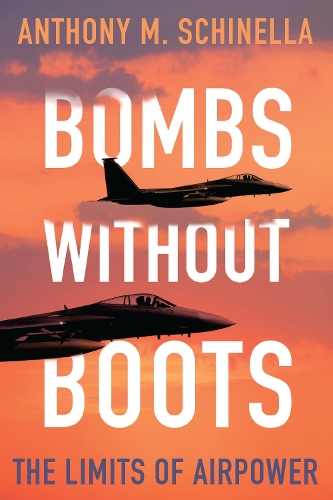
Bombs without Boots: The Limits of Airpower
(Paperback)
Publishing Details
Bombs without Boots: The Limits of Airpower
By (Author) Anthony M. Schinella
Bloomsbury Publishing PLC
Brookings Institution
19th February 2019
United States
Classifications
Tertiary Education
Non Fiction
Air forces and warfare
Theory of warfare and military science
International relations
358.4009
Physical Properties
Paperback
392
Width 155mm, Height 222mm, Spine 27mm
517g
Description
Airpower can achieve military objectivessometimes, in some circumstances
It sounds simple: using airpower to intervene militarily in conflicts, thus minimizing the deaths of soldiers and civilians while achieving both tactical and strategic objectives. In reality, airpower alone sometimes does win battles, but the costs can be high and the long-term consequences may fall short of what decision-makers had in mind.
This book by a long-time U.S. intelligence analyst assesses the military operations and post-conflict outcomes in five cases since the mid-1990s in which the United States and/or its allies used airpower to solve military problems: Bosnia in 1995, Kosovo in 1999, Afghanistan in 2001, Lebanon in 2006, and Libya in 2011. In each of these cases, airpower helped achieve the immediate objective, but the long-term outcomes often diverged significantly from the original intent of policymakers. The author concludes that airpower sometimes can be effective when used to support indigenous ground forces, but decision-makers should carefully consider all the circumstances before sending planes, drones, or missiles aloft.
Reviews
Bombs Without Boots is an insightful and useful read for anyone interested in the use of military force abroad. It would be especially useful in professional military education courses where officers from different services-air, ground, and sea-could discuss and debate Schinella's conclusions.Nathan K. Finney, Parameters
A mix of history and strategy that significantly adds to the debate of airpower capabilities and limitations. . . operational and strategic air planners should pick up a copy of Bombs Without Boots.Maj. Ian S. Bertram, USAF, Air & Space Power Journal
As a study of airpower, and the nature of modern warfare, Bombs Without Boots is to be read. Nuanced, using both primary and secondary sources, it presents valuable lessons as well as recommendatons, especially at a time when Western aversion to casualties still dictates its enduring dependence on airpower to achieve military objectives.Dr. Guillaume Lasconjarias, Defence Studies
A new and thoughtful discussion of the limitations and utility of airpower when used without commitment of ground forces. Carefully constructed and exquisitely sourced, Bombs Without Boots is an exemplar of what analysis of a thorny and fundamental military issue should look like.Dale C. Rielage, Naval War College Review
Tony Schinella is one the countrys finest military analysts and with Bombs Without Boots he has contributed an absolute gem to Americas current security debate. Over the past twenty years, the United States has tried ever more frequently to win wars by employing air power in support of indigenous ground forces. Until now, no one has ever assessed the utility of this approachwhen it has worked, when it has failed, and why. Schinellas masterful analysis makes clear both the advantages and disadvantages. It should be a critical component of any debate when Americans contemplate employing this same strategy all over again, as we inevitably will.Kenneth M Pollack, resident scholar, American Enterprise Institute; author of Armies of Sand: The Past, Present, and Future of Arab Military Effectiveness
An outstanding work by one of Americas premier military analysts on the uses and limitations of airpower in modern conflict. It will be read and re-read by intelligence officers and military strategists for years to come.Michael Vickers, former U.S. undersecretary of defense for intelligence
Author Bio
Anthony M. Schinella is the National Intelligence Officer for Military Issues on the National Intelligence Council. He has spent more than 25 years serving in the U.S. government assessing foreign military forces and operations.
